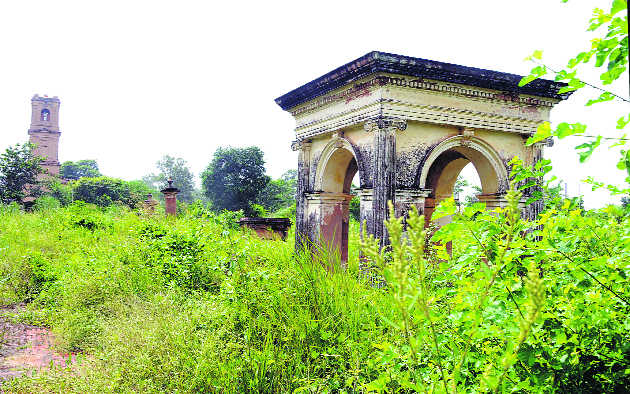European soldiers buried in Karnal
Parveen Arora
The remnants of the British era are buried in a cemetery situated opposite the National Dairy Research Institute (NDRI) on the Old GT Road in Karnal.
More than 500 graves of European soldiers and their family members are located in the 8,172 sq m cemetery. Tall memorial gravestones reflect the rich colonial gothic architecture. A church tower was established along it.
Historians claim that Karnal became a cantonment in 1806 and most of the buried soldiers died of malaria and cholera till 1842. Later the Army cantonment was shifted to Ambala in 1843.
Prof Raghuvendra Tanwar, emeritus professor of history and Director of the Haryana Academy of History and Culture, says the western Jamuna (Yamuna) Canal was the major reason behind the outbreak of malaria in the area. “This canal used to flow near the colony of the British officers (now Mall Road) and due to seepage into it malaria had become an epidemic, forcing them to leave Karnal”.
Malaria was the first reason of shifting the Army cantonment to Ambala. The second reason was that the British had to control Punjab and Ambala was a perfect place for the purpose.
“The British were eying Punjab but they could not achieve what they wanted as long as Maharaja Ranjeet Singh was alive because the Sutlej was a challenge. After his death in 1839, they started planning and shifting the Army cantonment to Ambala to control Punjab,” he says.
The Archaeological Survey of India (ASI) claims to maintain it, but the condition of the graveyard shows it has long remained neglected. Thick bushes can be seen along the graves and the paths. The graveyard has become an abode of venomous snakes.
An ASI office in the Kurukshetra office says that they maintain the graveyard, but the Horticulture Department looks after gardening.
The historians consider it to be a terrible fault on the part of the ASI. Tanwar says the persons buried in the graves were human beings. When the British left the country in 1947, there was a cordial atmosphere between Indians and them. The graveyard should be maintained properly in the true spirit of Indian traditions.
Prof KC Yadav, former Director of the Haryana Academy of History and Culture, says Karnal can claim the honour of being the first modern town planned on the European lines. In 1806, the British established an Army cantonment here and constructed simple but modern houses, barracks and shopping centres. Due to the malaria outbreak, they started shifting to Ambala in 1841 and Ambala became a cantonment in 1843.
All 500 graves of European soldiers and their family members were of the period between 1806 and 1843, he says.
He adds the names of the soldiers with their designations were carved on the graves. Among these graves, one was of General Anson, Commander-in-Chief of her Majesty’s Indian Forces, who died of cholera on May 27, 1857. Later, his family members exhumed his body and took it to England. Yadav says the remains of General Anson’s grave are still there. General Anson died when he was arranging for the forces to march on Delhi.
Yadav says the graveyard needs to be maintained and recommends the Commonwealth War Grave Commission for the work. With the help of these monuments they could learn about the British and the reasons behind their deaths.
Unlock Exclusive Insights with The Tribune Premium
Take your experience further with Premium access.
Thought-provoking Opinions, Expert Analysis, In-depth Insights and other Member Only Benefits
Already a Member? Sign In Now










